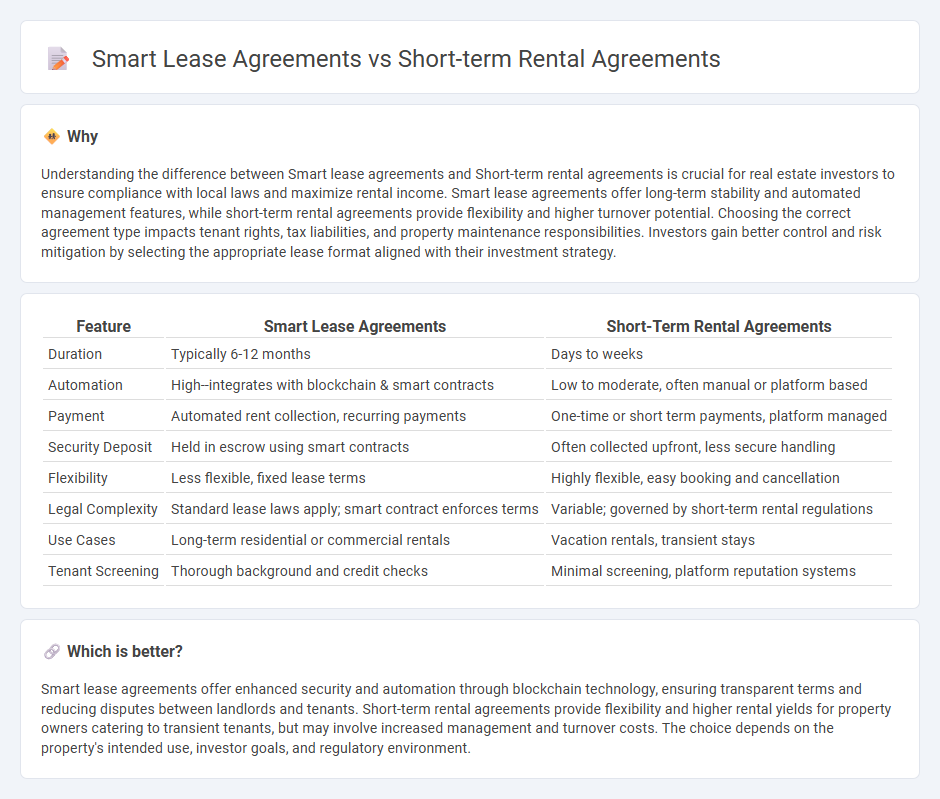
Smart lease agreements utilize blockchain technology to automate rent payments and enforce contract terms securely, reducing fraud and disputes. Short-term rental agreements focus on flexible, temporary stays often managed through platforms like Airbnb, catering to tourists and transient tenants. Explore the key differences to determine which leasing option best suits your property needs.
Why it is important
Understanding the difference between Smart lease agreements and Short-term rental agreements is crucial for real estate investors to ensure compliance with local laws and maximize rental income. Smart lease agreements offer long-term stability and automated management features, while short-term rental agreements provide flexibility and higher turnover potential. Choosing the correct agreement type impacts tenant rights, tax liabilities, and property maintenance responsibilities. Investors gain better control and risk mitigation by selecting the appropriate lease format aligned with their investment strategy.
Comparison Table
| Feature | Smart Lease Agreements | Short-Term Rental Agreements |
|---|---|---|
| Duration | Typically 6-12 months | Days to weeks |
| Automation | High--integrates with blockchain & smart contracts | Low to moderate, often manual or platform based |
| Payment | Automated rent collection, recurring payments | One-time or short term payments, platform managed |
| Security Deposit | Held in escrow using smart contracts | Often collected upfront, less secure handling |
| Flexibility | Less flexible, fixed lease terms | Highly flexible, easy booking and cancellation |
| Legal Complexity | Standard lease laws apply; smart contract enforces terms | Variable; governed by short-term rental regulations |
| Use Cases | Long-term residential or commercial rentals | Vacation rentals, transient stays |
| Tenant Screening | Thorough background and credit checks | Minimal screening, platform reputation systems |
Which is better?
Smart lease agreements offer enhanced security and automation through blockchain technology, ensuring transparent terms and reducing disputes between landlords and tenants. Short-term rental agreements provide flexibility and higher rental yields for property owners catering to transient tenants, but may involve increased management and turnover costs. The choice depends on the property's intended use, investor goals, and regulatory environment.
Connection
Smart lease agreements and short-term rental agreements are connected through their use of digital platforms and automated processes that enhance efficiency and transparency. Smart leases utilize blockchain technology to securely manage contract terms, payments, and tenant interactions, which aligns with the flexible, tech-driven nature of short-term rental agreements. Both agreements facilitate seamless property management, reduce administrative overhead, and improve tenant experience in the evolving real estate market.
Key Terms
Duration
Short-term rental agreements typically span days to a few months, offering flexibility for transient stays and seasonal occupancy, whereas smart lease agreements leverage blockchain technology to automate lease enforcement over longer durations, often exceeding six months. The fixed duration and automated execution in smart leases reduce disputes and streamline property management, contrasting with the more traditional and manually managed short-term rentals. Explore how smart lease agreements can revolutionize your rental strategy and enhance operational efficiency.
Flexibility
Short-term rental agreements offer tenants high flexibility with lease durations typically ranging from days to months, allowing quick adjustments to changing circumstances. Smart lease agreements utilize blockchain technology to automate and customize terms, providing both flexibility and enhanced security by enabling real-time modifications and transparent contract execution. Explore how smart leases can revolutionize rental flexibility and security in your next agreement.
Technology Integration
Short-term rental agreements typically rely on standard digital platforms for booking and payment processing, offering basic tech integration such as online calendars and automated invoices. Smart lease agreements leverage blockchain technology, smart contracts, and IoT devices to enable real-time monitoring, secure automated payments, and enhanced transparency between landlords and tenants. Explore the latest advancements in lease technology to optimize your rental management strategy.
Source and External Links
Wisconsin Short-Term Rental Agreement Template - This template is designed for temporary rentals in Wisconsin, offering flexibility and legal protection for both property owners and tenants.
Short-Term Rental Agreement - This agreement outlines rental conditions for short-term stays, typically lasting between one and 30 days, and is beneficial for vacation rentals and temporary housing.
Short-Term Rental Agreement Template - This template helps hosts and guests by defining expectations and responsibilities, providing legal protection and additional peace of mind during short-term rentals.
 dowidth.com
dowidth.com